外研版七年级上七年级英语一般现在时的用法
【外研版】七年级英语上册Module5Myschoolday语法篇试题含答案
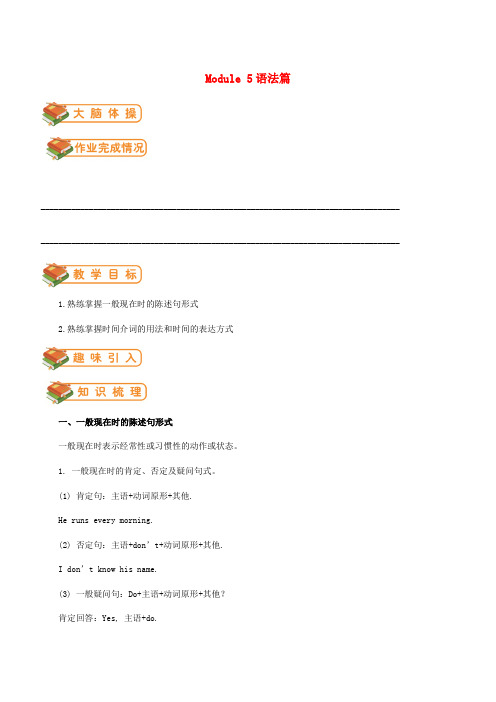
Module 5语法篇__________________________________________________________________________________ __________________________________________________________________________________1.熟练掌握一般现在时的陈述句形式2.熟练掌握时间介词的用法和时间的表达方式一、一般现在时的陈述句形式一般现在时表示经常性或习惯性的动作或状态。
1. 一般现在时的肯定、否定及疑问句式。
(1) 肯定句:主语+动词原形+其他.He runs every morning.(2) 否定句:主语+don’t+动词原形+其他.I don’t know his name.(3) 一般疑问句:Do+主语+动词原形+其他?肯定回答:Yes, 主语+do.否定回答:No, 主语+don’t.—Do you like maths?—Yes, I do./No, I don’t.(4) 特殊疑问句:疑问词+do+主语+动词原形+其他?When do you have Chinese?2. 在一般现在时中,行为动词前不能有连系动词be。
We don’t go to school on Saturday.3. do除用作助动词之外,还可用作行为动词,意为“做”。
将含有do one’s homework, do housework 等短语的肯定句变为否定句时,不能在原句谓语动词do后只接加not,而是应在do前加don’t或doesn't。
They don’t do their homework in the mornin g.二、时间介词in, on, at用法1. at常用来表示在某点时间,即“在几点几分;在某一时刻”。
如:She usually gets up at 6:00 in the morning. 她通常早上6点起床。
初中英语新外研版七年级上册Unit 3重点单词用法讲解(2024秋)

七年级英语上册Unit 3重点单词用法讲解1.silent不作声的,形容词。
silence寂静,名词。
in silence寂静地,无声地。
[例]He sat there in silence. Silently沉默地,寂静地,无声地,副词。
[例]They all stand silently for a moment.2.strict严格的,严厉的,形容词。
[用法](1)be strict with sb. 对某人很严厉。
[例]Miss Wang is strict with us.(2)be strict in sth. 对做的某事很严格。
[例]Mr Gao is strict with our homework.3.follow跟着,跟随,动词。
[用法]follow sb.跟随某人。
[例]An older man with a strict face follows him. Following接着的,下列的,形容词。
[例]You can choose one from the following three books.4.postman邮递员;邮差,名词。
复数形式是postmen。
[例]This is my favourite film, Postmen in the Mountains.5.touching感人的;动人的,形容词。
[例]It’s a touching story about the love between father ans son. Touch触摸;触碰,动词。
[例]I liked the cat when I touched it at the first time.6.serve为......工作;供职,动词。
[用法]serve as...充当/担任......。
[例]For years, my father served as the postman for this town. Service服务,名词。
七上英语书外研版第四单元知识点
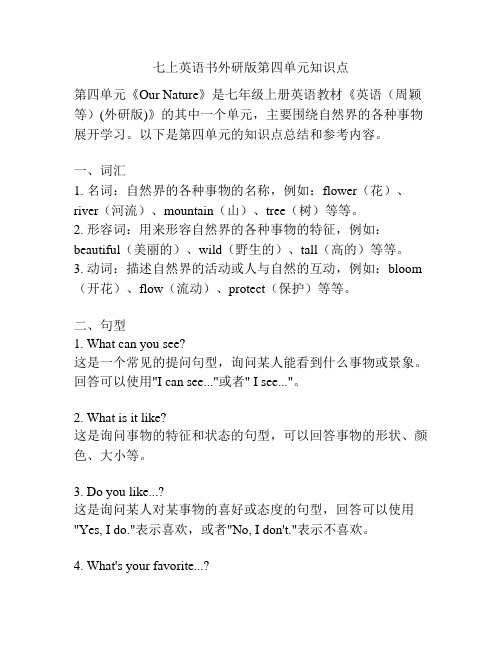
七上英语书外研版第四单元知识点第四单元《Our Nature》是七年级上册英语教材《英语(周颖等)(外研版)》的其中一个单元,主要围绕自然界的各种事物展开学习。
以下是第四单元的知识点总结和参考内容。
一、词汇1. 名词:自然界的各种事物的名称,例如:flower(花)、river(河流)、mountain(山)、tree(树)等等。
2. 形容词:用来形容自然界的各种事物的特征,例如:beautiful(美丽的)、wild(野生的)、tall(高的)等等。
3. 动词:描述自然界的活动或人与自然的互动,例如:bloom (开花)、flow(流动)、protect(保护)等等。
二、句型1. What can you see?这是一个常见的提问句型,询问某人能看到什么事物或景象。
回答可以使用"I can see..."或者" I see..."。
2. What is it like?这是询问事物的特征和状态的句型,可以回答事物的形状、颜色、大小等。
3. Do you like...?这是询问某人对某事物的喜好或态度的句型,回答可以使用"Yes, I do."表示喜欢,或者"No, I don't."表示不喜欢。
4. What's your favorite...?这是询问某人最喜欢的事物的句型,可以回答某个特定事物或特定类别的事物。
三、语法1. 一般现在时一般现在时表示经常发生的动作、事实、习惯、存在的状态等。
句子的基本结构是主语 + 动词原形 + 其他成分。
例如:I like flowers.(我喜欢花。
)2. 物主代词(形容词性物主代词和名词性物主代词)形容词性物主代词在句子中作定语,修饰名词,表明所属关系。
名词性物主代词在句子中作主语或宾语,替代名词。
例如:This is my book.(这是我的书。
)The book is mine.(这本书是我的。
外研版英语七年级上册语法总结
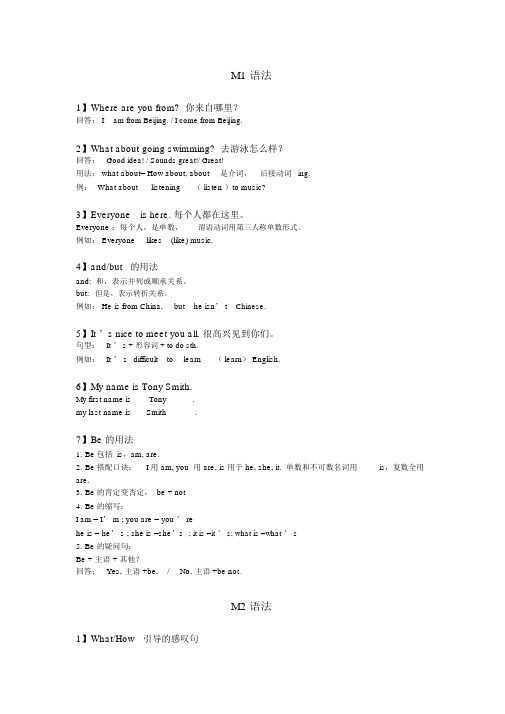
M1 语法1】Where are you from? 你来自哪里?回答: I am from Beijing. / I come from Beijing.2】What about going swimming? 去游泳怎么样?回答:Good idea! / Sounds great!/ Great!用法: what about= How about, about是介词,后接动词ing.例:What about _ _listening __ ( listen )to music?3】Everyone is here. 每个人都在这里。
Everyone :每个人,是单数,谓语动词用第三人称单数形式。
例如: Everyone __likes__(like) music.4】and/but的用法and: 和,表示并列或顺承关系。
but:但是,表示转折关系。
例如: He is from China, __but _ he isn’ t Chinese.5】It ’s nice to meet you all. 很高兴见到你们。
句型:It ’ s + 形容词 + to do sth.例如:It ’ s difficult _ to learn_ _ ( learn) English.6】My name is Tony Smith.My first name is ___ Tony______.my last name is___ Smith ______.7】Be 的用法1.Be 包括 is,am, are.2.Be 搭配口诀:I 用 am, you 用 are, is 用于 he, she, it. 单数和不可数名词用is,复数全用are.3.Be 的肯定变否定, be + not4.Be 的缩写:I am = I’ m ; you are = you ’ rehe is = he’ s ; she is =she’s; it is =it ’ s; what is =what ’ s5. Be 的疑问句:Be + 主语 + 其他?回答:Yes, 主语 +be. / No, 主语 +be not.M2 语法1】What/How引导的感叹句What + a/an + 形容 + 名+ (主 +)!=How + 形容 / 副 + 主 +!What a big family ( it is ) ! =How big the family is!What fine weather ( it is )! = How fine the weather is!2】in front of在前面/ in the front of在前部3】名词所有格两人共有: A and B’ s + is两人分有:A’ s and B’ s +are例如:Mrs Green is __A__ mother.A. Lingling and Lucy’ sB. Lingling’ s and Lucy’ sC. Lingling’ s and Lucy4】合成词合成复数,一般情况,后面的复数。
2013外研版七年级上册一般现在时复习用课件
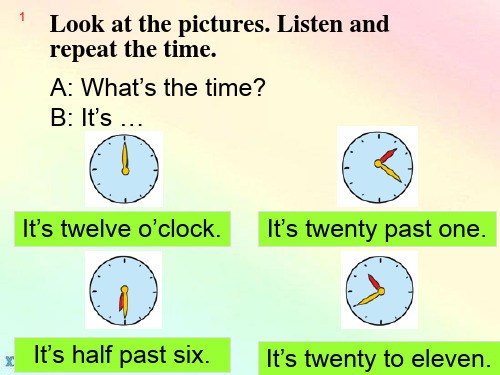
6. 3:45 _____________________________ three forty-five/a quarter to four
二、用相应的介词填空。
1. I have dinner __ seven at home. at
2. Lucy can go to the factory ____ her with
二、用所给的单词的适当形式填空。 1. She ____ (go) to bed at nine o’clock. goes 2. You don’t go (not go) home. ________ 3. She _______ (watch) TV in the evening. watches 4. He gets up and ___ (have) breakfast. has 5. _______ (lesson) start at half past one in Lessons the afternoon. 6. We do our __________ (homework) in homework the evening.
在表述日常行为时会用到时间,要注 意英汉不同的时间表达方式, 试比较: at half past six (6:30) 在6点半
at five past six (6:05) 在6点5分
at twenty to seven 6:40) 在6点40分
注意:如果是半小时以内的时间,一般 用几点过几分的表达方式,即 “…past…”, 如: 5:25可以表达为twenty-five past five; 如果超过了半小时,则用还差几分不到几 点的表达方式,即 “…to…”, 如: 5:45 就要表达为 fifteen to six。
新版外研版七年级(上册)英语知识点解析

新版外研版七年级(上册)英语知识点解析本文是对新版外研版七年级(上册)英语课程内容进行的知识点解析,旨在帮助学生更好地掌握英语知识。
语法知识点1. 祈使句祈使句是表达命令、请求、劝告等意义的句子,通常用动词原形作谓语。
例如:- Sit down.- Don't be late.- Study hard.2. 一般现在时一般现在时表示现在经常、惯性的动作或者真理等。
一般现在时的肯定句结构为:主语 + 动词原形(第三人称单数要加-s)。
例如:- She often takes a bus to school.词汇知识点1. 数词数词用来表示数字、数量的词汇。
例如:- one, two, three, four- first, second, third, fourth2. 物品名称研究物品的名称可以帮助我们更好地了解和描述身边的事物。
例如:- pencil, eraser, ruler, book- desk, chair, blackboard, whiteboard交际知识点1. 问路当需要问路时,我们可以使用以下语句:- Excuse me, where is the nearest post office?- Can you tell me how to get to the library?2. 自我介绍自我介绍时,我们可以使用以下语句:- Hello/Hi, my name is ___. I am ___ years old.本文总结了新版外研版七年级(上册)英语课程中的相关语法、词汇、交际知识点,帮助学生更好地掌握英语知识,提高英语水平。
七年级上册英语版外研版
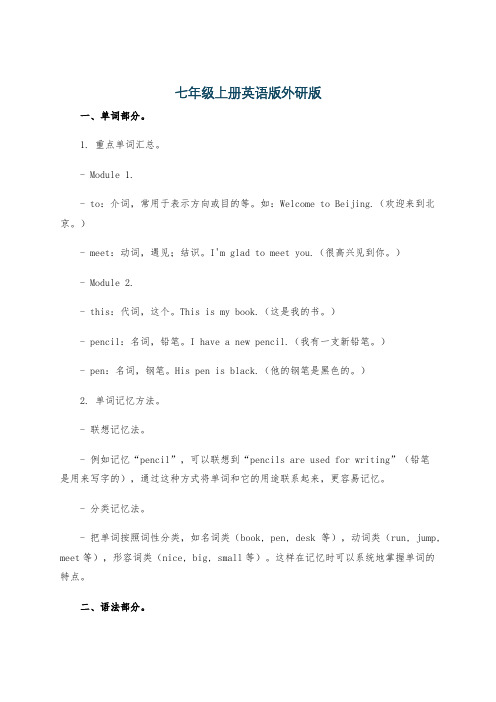
七年级上册英语版外研版一、单词部分。
1. 重点单词汇总。
- Module 1.- to:介词,常用于表示方向或目的等。
如:Welcome to Beijing.(欢迎来到北京。
)- meet:动词,遇见;结识。
I'm glad to meet you.(很高兴见到你。
)- Module 2.- this:代词,这个。
This is my book.(这是我的书。
)- pencil:名词,铅笔。
I have a new pencil.(我有一支新铅笔。
)- pen:名词,钢笔。
His pen is black.(他的钢笔是黑色的。
)2. 单词记忆方法。
- 联想记忆法。
- 例如记忆“pencil”,可以联想到“pencils are used for writing”(铅笔是用来写字的),通过这种方式将单词和它的用途联系起来,更容易记忆。
- 分类记忆法。
- 把单词按照词性分类,如名词类(book, pen, desk等),动词类(run, jump, meet等),形容词类(nice, big, small等)。
这样在记忆时可以系统地掌握单词的特点。
二、语法部分。
1. 一般现在时。
- 概念:表示经常发生的动作或存在的状态。
- 结构:- 主语为第三人称单数(he/she/it等)时,动词要用第三人称单数形式(一般在动词原形后加 -s或 -es)。
例如:He likes reading books.(他喜欢读书。
)- 主语为第一人称(I)、第二人称(you)和复数(we/they等)时,动词用原形。
如:We play football every day.(我们每天踢足球。
)- 用法:- 表示习惯性、经常性的动作。
例如:I get up at six o'clock every morning.(我每天早上六点起床。
)- 表示客观事实或真理。
The earth goes around the sun.(地球绕着太阳转。
2022年外研版初中英语专题复习学案:时态三-一般现在时
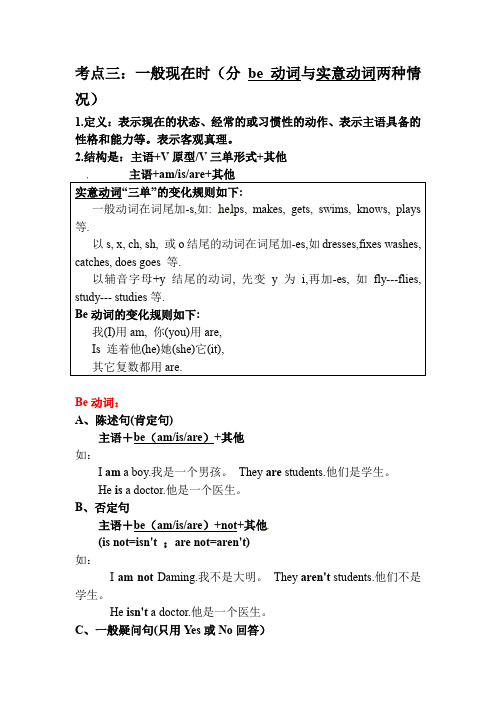
考点三:一般现在时(分be动词与实意动词两种情况)1.定义:表示现在的状态、经常的或习惯性的动作、表示主语具备的性格和能力等。
表示客观真理。
2.结构是:主语+V原型/V三单形式+其他主语+am/is/are+其他实意动词“三单”的变化规则如下:一般动词在词尾加-s,如: helps, makes, gets, swims, knows, plays 等.以s, x, ch, sh, 或o结尾的动词在词尾加-es,如dresses,fixes washes, catches, does goes 等.以辅音字母+y结尾的动词, 先变y为i,再加-es, 如fly---flies, study--- studies等.Be动词的变化规则如下:我(I)用am, 你(you)用are,Is 连着他(he)她(she)它(it),其它复数都用are.Be动词:A、陈述句(肯定句)主语+be(am/is/are)+其他如:I am a boy.我是一个男孩。
They are students.他们是学生。
He is a doctor.他是一个医生。
B、否定句主语+be(am/is/are)+not+其他(is not=isn't ;are not=aren't)如:I am not Daming.我不是大明。
They aren't students.他们不是学生。
He isn't a doctor.他是一个医生。
C、一般疑问句(只用Yes或No回答)Be(am/is/are)+主语+其他?如:Are you Daming? 你是大明吗?Is he a teacher?他是一个老师吗?实意动词:A、陈述句(肯定句)主语(非三单)+V原+其他如:I play basketball every day.我都去打篮球。
They go to sc hool every day.他们每天都去上学。
外研社七年级英语上册M5语法:一般现在时

_Y_e_s_, _,_th_e_r_e_i_s__.
7. Jack likes Chinese food very much.(改
为一般疑问句,并作肯定回答)
Do_e_s_J_a_c_k__li_k_e__C_h_i_n_e_s_e_f_o_o_d__v_e_ry__m__u_c_h_?_ _Y_e_s_,_h_e__d_o_e_s_._
一般现在时
一般现在时
• 1. 能讲出一般现在时的基本概念和常用的时 间标志词( always, on Monday , often, in the morning ...)。
• 2. 能写出一般现在时行为动词的第三人称单 数形式的变化。
• 3. 能写出一般现在时be动词和动词在句中变 化。
目录
Part 1 基础知识 Part 2 特殊考点 Part 3 总结 Part 4 实践出真知
No,___h__e__ ____is_n_’t.
一般现在时变否定句口诀:若是没有be动词,do, does,not加动原 要牢记。
• 结构2:主语+行为动词(V原形/V三单)+其它 (但是当主语是第三人称单数时,行为动词+s/es/y改i加es) • We go to school at 7:00. • Lucy goes to school at 7:00. • She stduies English every day. 否定句结构:主语+don’t/doesn’t+动词原形+其它 • We don’t go to school at 7:00. • Lucy doesn’t go to school at 7:00. • She doesn’t stduy English every day. • She goes to school at 7:00.
外研版七年级上册英语全册知识点归纳

外研版七年级上册英语全册知识点归纳MODULE 1一、同义句1.My name's Daming. = I'm Daming.2.I'm from England. = I come from England.3.Are you a new student? ≈ Are you new?4.Nice to meet you. = Nice to see you. =Glade to meet you. = Glade to see you.5.What's your name ? = May I have your name?二、特殊疑问句1. 询问姓名:—What's your name? —My name is .... = I’m…—What's his/her name? —His/her name is .... = He/She is…2.询问年龄:—How old are you? = Can you tell me your age?= What's your age?—I'm twelve years old.3.询问来自哪里:—Where are you from? —I'm from...—Where is he/she from? —He’s/She’s from...—Are you from China ? —Yes, I am/ we are. No, I’m not/ we aren’t.4.询问在哪个班:—What class are you in? —I'm in Class One, Grade Seven.三、单词1.China —Chinese America —American England —English capitalcity2.small — big first— last everyone all四、语法1.代词人称代词主格I you he she it we you they形容词性物主代词(…的)my your his her its our your their 2.be动词: am I am= I’m I am not= I’m notis He /She is = He’s /She’s is not = isn’tare We /You /They are = We’re / You’re /They’re are not= aren’tMODULE 2一、单词grandparents grandfather—grandmother parents father—mothermum---dad daughter—son sister—brother aunt—uncle cousin husband---wife family woman---man women---men职业:job actor driver doctor manager nurse worker teacher policeman 工作地点:factory hospital hotel office school theatre bus station shop二、短语a photo/picture of my family in front of in/at the front of next to on the right --- on the left三、语法1.this---that these---those I---we he/she/it---they2.名词所有格:Miss Li's =her Tom’s = hisLily and Lucy's 两人共有的eg: Lily and Lucy's desk is bigLily's and Lucy's 两人各有的Lily's and Lucy's desks are small.My parents’ room is very clean.四、句子1.---Is this your sister? --- Yes, it is. No, it isn’t---Are these her books? ---Yes, th ey are. No, they aren’t.2.---Who is this? --- This is my brother.--- Who are they/these? --- They are my cousins3. ---What’s your sister’s name?---My sister’s name is…/Her name is…4.---What does your father do?=What is your father's job?=What is your father?---He is a ...MODULE 3一、单词1.buildings: classroom, dining/sports hall, library, office, science lab, playground2.something: blackboard, book , room, computer, desk, furniture, map,wall, picture,television3.numbers: thirteen fourteen fifteen sixteen seventeen eighteen nineteenthirty forty fifty sixty seventy eighty ninety4.介词:next to ≈ near behind ≠ in front of in/at the front of:在......里面的前面in on under5. in the middle of on the left of--- on the right ofbetween …and… a map of our school6.right 正确的≠wrong右边的≠left二、句子1. Where is the office building ? It is between the dining hall and the library.2. How many students are there in your class? There are 38 students in my class.三、语法(There be)----Are there any school offices?----Yes, there are. There are some offices.----Is there a computer on Miss Li's desk?----No, there isn't.注意:1.就近原则:1). There is an orange and two apples on the desk.There are two apples and an orange on the desk.2). There are some students in the classroom.Are the re any students in the classroom? Yes, there are. No, there aren’t 3)There aren’t any students in the classroom.There isn’t an orange on the desk.MODULE 4一、family members:aunt uncle grandma grandmother grandpa grandfather mother father mum dad sister brother二、短语句型Thank you for your email.your help.helping me.asking me.inviting me.Make a family tree for your family.----How many people are there in your family?----There are four. There are my mum and dad, my sister and me.----Have you got an aunt?/any .....?----Yes,I have./No,I haven't.----Have you got a small family or a big family?----I've got a big family.or的用法:①或; (选择疑问句)②并列否定:I don't like swimming or dancing.MODULE 5-6一、单词1. orange 橙汁have some orange [U]橙色the oranges are orange [C]橙子This is an orange [C]2.kind 善良He is very kind.种类=tyre a kind / type of fruit two kinds /types of fruits3. gym: 不受天气影响的室内体育馆、健身房或运动馆stadium: 周围有看台的露天大型运动场4.healthy ≠ unhealthy keep/stay healthy保持健康in good health ≠ in poor/bad healthbe healthy = be in healthbe good for one’s health ≠be bad for one’s health名词变复数条件变化形式例词一般情况+ - s shops单词以s、x、ch、sh结尾+ - es buses 以辅音字母+y结尾去y为i + -es city-cities 单词以“o”结尾有生命+ - es tomatoes无生命+ - s zoos一些以‘f’或‘fe’结尾的单词把’f‘或’fe‘变成’ves'knife-knives二、短语三、句型四、区别MODULE 7一、短语talk about sth.谈论某事talk to sb. 跟某人谈话(一方讲一方听)talk with sb. 跟某人谈话(双方都讲)get up≠go to bedgo home≠leave home(for)study science/history/chemistry/maths/...二、语法①时间表达法:What's the time? =What time it is?顺读法:It's two ten. 2:10 (直接读出数字)逆读法:①It's te n past two.(2:10) ≤30'②It's ten to ten. (2:50) >30'整点表达法:It's two o'clock. (2:00) 注意:(不用介词)②一般现在时(1)【No. 1】一般现在时的功能1.表示事物或人物的特征、状态。
新版外研版七年级英语上册Module7Computers语法篇试题
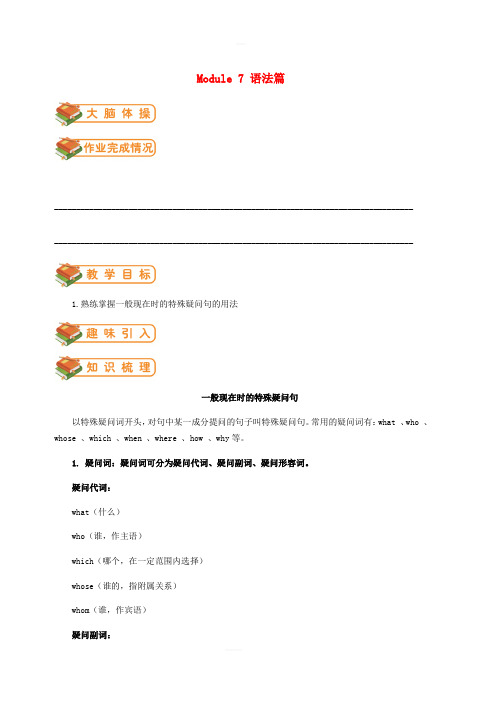
Module 7 语法篇____________________________________________________________________________________________________________________________________________________________________1.熟练掌握一般现在时的特殊疑问句的用法一般现在时的特殊疑问句以特殊疑问词开头,对句中某一成分提问的句子叫特殊疑问句。
常用的疑问词有:what 、who 、whose 、which 、when 、where 、how 、why等。
1. 疑问词:疑问词可分为疑问代词、疑问副词、疑问形容词。
疑问代词:what(什么)who(谁,作主语)which(哪个,在一定范围内选择)whose(谁的,指附属关系)whom(谁,作宾语)疑问副词:when(何时,询问时间)where(何地,询问地点)why(为什么,询问原因)how(如何,询问手段,方式,工具以及程度)疑问形容词:what(which,whose)+名词2. 语序:特殊疑问句有两种语序:(1)如疑问词作主语或主语的定语,即对主语或主语的定语提问,其语序是陈述句的语序.Who is singing in the room? 谁在房间唱歌?whose bike is broken? 谁的自行车坏了?(2)如疑问词作其他成分,即对其他成分提问,其语序是:特殊疑问词+一般疑问句。
What does she like? 她喜欢什么?What class are you in? 你在哪班?1.(2012年新疆乌鲁木齐中考)We have an English party on Saturday.(就划线部分提问)you have an English party?2.(青海中考改编)He writes to his mother on Sunday. (就划线部分提问)he writes to on Sunday.3. --- do you go to school every day?---By bike.A. HowB. WhereC. WhatD. When4.---Where a fish ?---In a river.A. is; liveB. is; livesC. does; liveD. do; lives5. --- do you use a computer?---Sometimes.A. HowB. How oftenC. WhenD. Where6.--- do you put the bag?---On my desk.A. WhatB. WhenC. WhereD. How7.--- size do you wear?---Size L.A. HowB. WhoC. WhenD. What8.--- do you like?---Red.A. What colourB. What sizeC. What languageD. What time解析及答案:1. 可用“语法分析法”。
外研版三起七年级上册英语
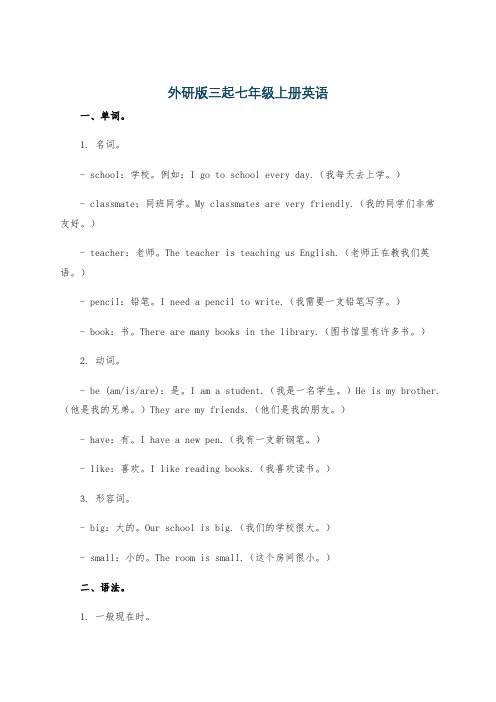
外研版三起七年级上册英语一、单词。
1. 名词。
- school:学校。
例如:I go to school every day.(我每天去上学。
)- classmate:同班同学。
My classmates are very friendly.(我的同学们非常友好。
)- teacher:老师。
The teacher is teaching us English.(老师正在教我们英语。
)- pencil:铅笔。
I need a pencil to write.(我需要一支铅笔写字。
)- book:书。
There are many books in the library.(图书馆里有许多书。
)2. 动词。
- be (am/is/are):是。
I am a student.(我是一名学生。
)He is my brother.(他是我的兄弟。
)They are my friends.(他们是我的朋友。
)- have:有。
I have a new pen.(我有一支新钢笔。
)- like:喜欢。
I like reading books.(我喜欢读书。
)3. 形容词。
- big:大的。
Our school is big.(我们的学校很大。
)- small:小的。
The room is small.(这个房间很小。
)二、语法。
1. 一般现在时。
- 用法。
- 表示经常或习惯性的动作或存在的状态。
例如:He gets up at six o'clock every day.(他每天六点起床。
)- 表示客观事实或普遍真理。
The earth goes around the sun.(地球绕着太阳转。
)- 句子结构。
- 主语 + be (am/is/are)+ 其他。
如:I am twelve years old.(我十二岁了。
)- 主语(非第三人称单数)+ 动词原形+ 其他。
We play football after school.(我们放学后踢足球。
外研版七年级上册Module7 知识点+习题(含答案)

第7讲Computers学习目标一、熟练掌握重点单词、词组的用法;二、熟练掌握一般现在时的特殊疑问句的用法;三、会做对划线部分提问;四、对句型变化掌握更加熟练;五、理解并运用关于电脑的介绍。
知识串烧单词1、keyboard ['ki:,bɔ:d] 键盘2、mouse [maʊs] 鼠标;老鼠3、screen [skri:n] 屏幕4、connect [kə'nekt] 连接5、turn [tɜːn] 转动6、turn on 打开7、learn [lɜːn] 学;学习8、document ['dɒkjʊmənt] 文件9、click [klɪk] 点击10、use [juːz] 使用11、save [seɪv] 保存;储存12、box [bɒks] 框;盒子13、finally ['faɪnəlɪ] 最后14、print [prɪnt] 打印15、paper ['peɪpə] 纸16、share [ʃeə] 共用、分享17、Australia [ɒs'treɪlɪə] 澳大利亚18、company ['kʌmpənɪ] 公司;剧团19、often ['ɒfən] 经常20、customer ['kʌstəmə] 顾客21、internet ['ɪntənet] 因特网22、check [tʃek] 检查、查看23、train [treɪn] 火车24、travel ['trævl] 旅行25、plan [plæn] n.计划26、v.计划;打算27、ticket ['tɪkɪt] 票28、music ['mjuːzɪk] 音乐29、movie ['muːvɪ] 电影30、night [naɪt] 夜晚31、search [sɜːtʃ] 搜寻;搜索;查找32、information [ɪnfə'meɪʃn] 信息33、email ['iːmeɪl] 电子邮件34、send [send] 发送35、game [geɪm] 游戏36、sometimes ['sʌmtaɪmz] 有时候;不时37、cinema ['sɪnɪmə] 电影院38、clothes [kləʊðz] 衣服(总称)39、visit ['vɪzɪt] 探望;参观40、holiday ['hɒlɪdeɪ] 假日;节日课文U1 How do I write my homework on the computer? Linging: How do I write my homework on the computer? Can I learn?Betty: Sure! First, open a new document. Click the mouse on "new document". Linging: What's the mouse? Is this it?Betty: Yes.Linging: Where do I click on "new document"?Betty: On the left of the screen... there!Linging: OK, what's next?Betty: Next, you write your homework in the new document. Use the keyboard.Linging: What do I do next? How do I save the document?Betty: You click "save", and write a name for it.Linging: Where do I write the name?Betty: Write it in the box. OK, then click "save" again.Linging: OK. Finally, how do I print my document?Betty: Click "print" and "OK".Linging: What about some paper?Betty: Oh yes, of course! You put the paper in there first!U2 When do you use a computer?There is a computer in my home, and my father and I shares it. My father is a manager of a company, so he often talks to his customers on the computer. He also goes on the Internet to check the times of trains, make travel plans, and buy tickets. I listen to music or watch movies on it every Friday night. – JackThere is no computer in my home. I can only use it at school. On the Internet, I search for information, do my homework and check my email. I have a friend in Australia.I can see her and talk to her on the Internet. – AliceWe have a computer at home. My parents don't use it. I can use it on Sundays. I send email to my friends and play computer games. But sometimes I play a lot of games and my mother doesn't like it. -- Mike语法一、一般现在时的特殊疑问句A.定义:以特殊疑问词开头,对句中某一成分提问的句子叫特殊疑问句。
外研版七年级上册英语重点短语及句子-整理

外研版七年级上册英语重点短语及句子-整理外研版七年级上册英语知识点Module 1重点短语4.in Class Ten, Grade Seven在七年级十班6.first n ame = give n n ame名st n ame = family n ame姓8.En glish n ame英文名字9.Chin ese n ame中文名字重点句子1.I'm Chinese ,and I'm from China.我是中国人,我来自中国=I'm Chinese, and I come from China.2.Where are they from?他们来自什么哪里=Where do they come from?They are from America.他们来自美国.=They come from America.3.How old is that man?那位男子多少岁了He is forty-four.他44岁4.The students are in Class Five, Grade Seven. 这些学生在七年级五班5.Tom is in Class One with Lingling.汤姆和玲玲在一班。
=Tom with Li ngli ng is in Class One.=Tom and Lin gli ng are in Class One.6.What about you? = How about you?=And you? 你呢?/你怎么样?7.Welcome to Class 6 Grade 7 !欢送到七年级六班。
8.Beiji ng is the capital of China.北京是中国的首都。
9.Good to see you.=Nice to see you.= Glad to see you.很快乐见到你。
10.I'm Tony Smith.Tony is my first name and Smith is my last n ame.我是Tony Smith,Tony是我的名,Smith是我的姓。
外研版初中七年级上册
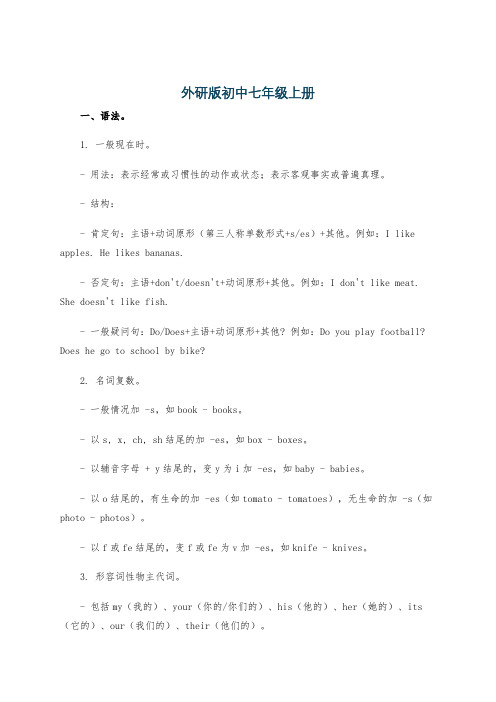
外研版初中七年级上册一、语法。
1. 一般现在时。
- 用法:表示经常或习惯性的动作或状态;表示客观事实或普遍真理。
- 结构:- 肯定句:主语+动词原形(第三人称单数形式+s/es)+其他。
例如:I like apples. He likes bananas.- 否定句:主语+don't/doesn't+动词原形+其他。
例如:I don't like meat. She doesn't like fish.- 一般疑问句:Do/Does+主语+动词原形+其他? 例如:Do you play football? Does he go to school by bike?2. 名词复数。
- 一般情况加 -s,如book - books。
- 以s, x, ch, sh结尾的加 -es,如box - boxes。
- 以辅音字母 + y结尾的,变y为i加 -es,如baby - babies。
- 以o结尾的,有生命的加 -es(如tomato - tomatoes),无生命的加 -s(如photo - photos)。
- 以f或fe结尾的,变f或fe为v加 -es,如knife - knives。
3. 形容词性物主代词。
- 包括my(我的)、your(你的/你们的)、his(他的)、her(她的)、its (它的)、our(我们的)、their(他们的)。
- 用法:后面必须接名词,用来表示所属关系。
例如:This is my book.二、词汇。
1. 家庭成员相关。
- father(父亲)、mother(母亲)、parent(父母)、grandfather(祖父/外祖父)、grandmother(祖母/外祖母)、grandparent(祖父母/外祖父母)、brother (兄弟)、sister(姐妹)、son(儿子)、daughter(女儿)。
2. 学校相关。
- school(学校)、classroom(教室)、teacher(教师)、student(学生)、desk(书桌)、chair(椅子)、book(书)、pencil(铅笔)、pen(钢笔)。
外研版七年级英语上语法知识点汇总

外研版七年级英语上册语法知识点汇总一,肯定的祈使句祈使句用来表示请求、命令、叮嘱、邀请、劝告或祝愿等,通常省略主语,直接用动词原形开头,句尾用句号或感叹号。
常用句型是:肯定句用“动词原形+……”,否定句用“Don't + 动词原形+……”。
有时,在祈使句前面或末尾加上please,显得有礼貌。
例:Come in, please! 请进!)Don't open your book!不要打开书。
以Let开头的祈使句的肯定句和否定句。
Let him not speak! 让他不要讲话!Don’t let him speak!不要让他讲话!二,基数词的表达三,what引导的特殊疑问句疑问词what引导的特殊疑问句,询问事物内容或者人的职业。
此类疑问句可以对主语、表语和宾语提问。
?1. 对主语提问例:What is in your pocket?你口袋里有什么?这个问题可以有两种回答:a:There is an egg in it. 在口袋里有一个蛋。
b:An egg (is in it). 一个蛋(在里面)。
-What are there in the room? 屋子里有什么?-There are a lot of chairs in it. 里面有许多椅子。
|注意:回答此句型的问题时,答句的单复数根据实际情况而定。
2. 对宾语提问例:-What did you buy?-你买了什么?-I bought a bike.-我买了辆自行车。
3. 对表语提问例:-What is this?-这是什么?,-It's a bench. -这是一条长凳。
-What is your mother?-你妈妈是干什么的?-She is a teacher. 她是一名老师。
注意:What is+人? 此句型询问人的职业。
还可用What is sb's job?或者What does/do sb. do? 询问人的职业。
Unit4+P72-73+文章的知识点 外研版英语七年级上册
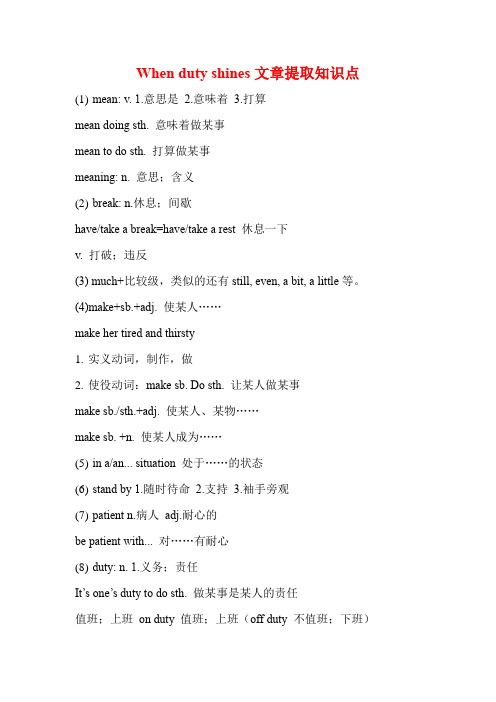
When duty shines文章提取知识点(1)mean: v. 1.意思是2.意味着3.打算mean doing sth. 意味着做某事mean to do sth. 打算做某事meaning: n. 意思;含义(2)break: n.休息;间歇have/take a break=have/take a rest 休息一下v. 打破;违反(3) much+比较级,类似的还有still, even, a bit, a little等。
(4)make+sb.+adj. 使某人……make her tired and thirsty1.实义动词,制作,做2.使役动词:make sb. Do sth. 让某人做某事make sb./sth.+adj. 使某人、某物……make sb. +n. 使某人成为……(5)in a/an... situation 处于……的状态(6)stand by 1.随时待命2.支持3.袖手旁观(7)patient n.病人adj.耐心的be patient with... 对……有耐心(8)duty: n. 1.义务;责任It’s one’s duty to do sth. 做某事是某人的责任值班;上班on duty 值班;上班(off duty 不值班;下班)(9)regret: v. 后悔;遗憾n. 懊悔regret to do sth. 对要做的事感到遗憾(事情未作)regret doing sth. 对做过的事感到后悔(事情已做)(10)be with sb. 和某人在一起with用法总结:1.(表示关系)和……一起talk with sb. 和某人谈话work with sb. 和某人一起工作2.(表示状态)具有,带有【反】withouta girl with golden hair 金发女孩a room with two doors 开有两个门的房间3.(表示方式)用,以write with a pen 用铅笔写字cut with a knife 用小刀切(11)decision: n. 决定;抉择decide v.决定make a decision 做决定make a decision to do sth.=decide to do sth. 决定做某事(12)thankful: adj. 感谢的;感激的be thankful to sb. 感谢某人be thankful for sth. 对某事表示感谢(13)one of +名词复数、代词宾格,表示“……之一”,谓语动词用单数。
- 1、下载文档前请自行甄别文档内容的完整性,平台不提供额外的编辑、内容补充、找答案等附加服务。
- 2、"仅部分预览"的文档,不可在线预览部分如存在完整性等问题,可反馈申请退款(可完整预览的文档不适用该条件!)。
- 3、如文档侵犯您的权益,请联系客服反馈,我们会尽快为您处理(人工客服工作时间:9:00-18:30)。
3.表主语具备的性格和能力等:
e.g. She likes noodles. They speak French.
4.普遍真理和自然规律:
e.g. Two plus four is six. The moon goes around the earth.
我父母每星期给我妹妹十元钱。 My parents give ten yuan to my sister every week. 2 如果主语是单数名词 第三人称单数 和 不可数名词,谓语动词要变化
一 动词的变化规则
(1).一般情况下,直接加-s (2).以s. x. sh. ch. o结尾,加-es (3).以“辅音字母+y”结尾,变y为i, 再加-es
写出下列动词的第三人称单数 talk______forget______hope______stop______perform______play______say______ buy______worry______fly______study_______like_______make______take______ love_______recite_______become_______come_______drive_______shine_______ write_______hike______give______see______ stop______shop_______plan______get_______sit_______let_______ cut_______ run_______forget_______begin_______ wash_____watch_______ finish______teach_____fish_______reach_______go_______ do_____ (4).特殊变化的词
You do not work.
Don't you work?
We work.
Do you work?
We do not work.
Don't you work?
They work. He(She,It) works.
Do they work? Does he(she,it) work?
They do not work. He(She,It) does not work.
9. She is always a good student.(改为一般疑问句,作否定回答) ________________________________________________________ 10. Simon and Daniel like going skating.(改为否定句) 11. Do you often play football after school? (肯定回答) _______________ 12. I have many books. (改为否定句)_________________________ 13. Gao Shan's sister likes playing table tennis.(改为否定句)_________________ 14. She lives in a small town near New York. (改为一般疑问句)_________________ 15. I watch TV every day. (改为一般疑问句)___________________________ 16. David has got a goal. (改为一般疑问句)_________________________ 17. We have four lessons.(改为否定句)____________________________
•时态是英语谓语动词的一种形式, 表示动作发生的时间和所处的状态。
构成 1. be动词:主语+be(am,is,are)+其它。如: I am a boy.我是一个男孩。 2.行为动词:主语+行为动词(+其它)。如 We study English.我们学习英语
一 动词的变化规则 1如果主语是名词复数和第一人称I、 we ,谓语动词不用变化, 仍然用动词原型表示 We usually go to school at 7:30 我们通常7:30上学去
doesn’t watch TV every evening 1. Daniel watches TV every evening.(改为否定Daniel )_________________________ 2. I do my homework every day.(改为一般疑问句,并作否定回答) ________________________________________________________ Do you do your homework every day? Yes.I do 3. She likes milk.(改为一般疑问句,并作肯定回答) Does she like milk ___________________________ 4. Amy likes playing computer games.(改为一般疑问句,并作否定回答) Does Amy like playing computer games Yes,she does ___________________________________________________ 5. We go to school every morning.(改为否定句)____________________________ 6. He speaks English very well.(改为否定句)________________________ 7. I like taking photos in the park.(对划线部分提问)__________________________ 8. John comes from Canada.(对划线部分提问)________________ - am, is, are have (有) - has have,
一般现在时(The Simple Present Tense)
1.表示现在的状态:
e.g. He’s twelve. She’s at work.
2.表经常或习惯性的动作:
e.g. I get up at 6:30 every day.
Don't they work? Doesn't he(she it) work?
二、用括号内动词的适当形式填空。 1 has 1. He often ________(have) dinner at home. 2 are 2. Daniel and Tommy _______(be) in Class One. 3 doesn't watch 3. We _______(not watch) TV on Monday. 4. Nick _______(not go) to the zoo on Sunday. 4 doesn't go 5 Do like 5. ______ they ________(like) the World Cup? 6. What _______they often _______(do) on Saturdays? 6 do do 7. _______ your parents _______(read) newspapers every day? 7 Do read 8. The girl _______(teach) us English on Sundays. 8 teaches 9. She and I ________(take) a walk together every evening. 9 take 10. There ________(be) some water in the bottle. 10 is 11. Mike _______(like) cooking. 11 likes 13. My aunt _______(look) after her baby carefully. 13 look/is looking 14. You always _______(do) your homework well. 14 do 15. I _______(be) ill. I'm staying in bed. 15 am 16. She _______(go) to school from Monday to Friday. 16 goes 17. Liu Tao _______(do) not like PE. 17 does 18. The child often _______(watch) TV in the evening. 18 watches 19. Su Hai and Su Yang _______(have) eight lessons this term. 19 have 20. -What day _______(be) it today? - It's Saturday. 20 is 21 We often ___________ (play) in the playground. 21 play 22. He _________ (get) up at six o'clock. 22 gets
• • • • • • • • • • • •
19. Su Hai and Su Yang _______(have) eight lessons this term. 20. -What day _______(be) it today? - It's Saturday. 21 We often ___________ (play) in the playground. 22. He _________ (get) up at six o'clock. 23. ________ you __________ (brush) your teeth every morning? 24. What ________(do) he usually ________ (do) after school? 25. Danny ____________ (study) English, Chinese, math, science and art at school. 26. Mike sometimes __________ (go) to the park with his sister. 27. At eight at night, she ____________ (watch) TV with her parents. 28. ________ Mike _________ (read) English every day? 29. How many lessons _________ your classmate _________ (have) on Monday? 30.What time _________ his mother _________ (do) the housework?
